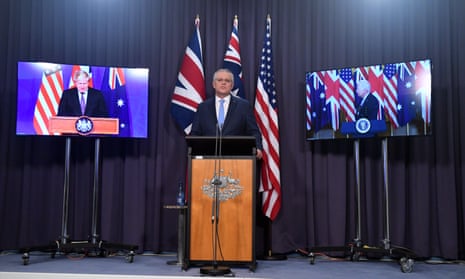No one – least of all Beijing – believes the denials. The new defence pact between the US, UK and Australia is unmistakably aimed at containing China. The question is how substantive it will prove to be. The initial project – Canberra’s acquisition of nuclear-powered submarines, with Washington and London’s help – is prompted in part by growing Australian frustration over its troubled contract for French-made vessels. But it opens the way for greater military cooperation and is to be underpinned by wide-ranging collaboration on areas such as cyber-security, artificial intelligence and quantum computing, which China is pursuing intensively.
Joe Biden appears to be realising Barack Obama’s pledge of a pivot to Asia, with US capacity freed by withdrawal from Afghanistan, and China’s behaviour ringing alarm bells internationally. The Aukus pact binds the UK and Australia more closely to the US position, and should augment US military power in the region (though France, Europe’s most significant Indo-Pacific player, is openly furious). Though Boris Johnson has highlighted the promise of UK jobs, a White House official described the deal as a “downpayment on global Britain”.
Three years ago, Australia’s prime minister, Scott Morrison, insisted Canberra need not choose between Beijing and Washington. Now he seems to have judged that China has made the choice for him, given the punishing trade war, the treatment of Australian citizens, mammoth hikes in military spending (albeit from a lower base than the US) and its broader behaviour. Donald Trump’s presidency gave China an opportunity to strengthen relationships with US allies; the pandemic gave it an opportunity to rebalance towards cooperation. Instead, it accelerated course with Wolf Warrior diplomacy, trade pressure, clashes with India and more frequent incursions into Taiwan’s air defence identification zone, and upped the ante in the South China Sea.
The result is growing coordination among anxious nations. The anglophone “Five Eyes” intelligence-sharing nations have increased cooperation; Australia and the US have worked more closely with India and Japan in the “Quad”; the UK invited India, South Korea and Australia (as well as South Africa) to the G7. At US prompting, Nato has taken a stronger line on China.
A firm and unified response to China’s actions by democratic nations is both sensible and desirable. Whether the new pact will restrain it – or prompt it to boost its military even further, pursue closer relations with Russia, and intensify other forms of pressure – remains to be seen. Beijing’s attacks on “cold war mentality” are about perception, not just rhetoric. This week we learned that the top US military officer reportedly called his Chinese counterpart fearing that Beijing believed the Trump administration was preparing to attack. Mr Biden may believe he can pursue “extreme competition”, confronting Beijing in some areas and engaging it in others, but China clearly disagrees. It sent a junior official to meet John Kerry for climate change talks. Reportedly, Xi Jinping did not respond to the president’s proposal of a face-to-face summit.
While many herald Aukus as a momentous step, this is not a treaty but a statement of intent, with even the details of the submarine agreement 18 months away. Setting aside that project (and the real concerns it might open the door to proliferation), we cannot yet tell how significant the pact will be. Faith in US commitments is shakier in the wake of Mr Trump. What is certain is that this further sharpens the divide between China and the west.
